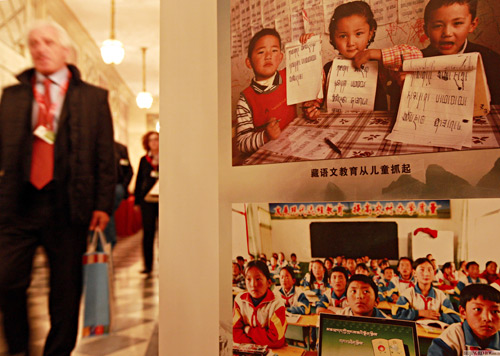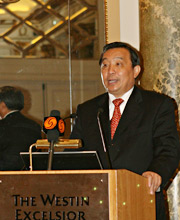|
 |
|
VISITING TIBET: The Second Forum on the Development of Tibet opened in Rome, Italy on October 22, 2009. The photo shows a participant passing by a forum poster (LUO HUANHUAN) |
The Second Forum on the Development of Tibet was held in Rome, Italy on October 22-23, 2009. The forum, with a theme of Tibet: Development Prospects and Cooperation Opportunities, was sponsored by the State Council Information Office of China, the Italy-China Foundation of Italy and the Chinese Embassy in Italy.
More than 400 people attended the forum, including government officials, experts and others from China, Italy, Austria, the United States, India, Australia, Spain and Belgium. More than 20 Chinese and foreign representatives exchanged ideas concerning the Tibet Autonomous Region's economy, culture, education, health and environmental protection. It was the second multilateral international forum on Tibet's development held by China's State Council Information Office and foreign organizations. The first such forum was held in Vienna, Austria, in 2007.
A Rome Declaration was passed and released at the conclusion of the forum. The declaration said that Tibet has developed in a half-century from a backward feudal economy to an open economy. Its achievements in modernizing are encouraging. Tibetan people's living standards have improved significantly. Participants said the forum will help the international society deepen its understanding of Tibet, find a cooperation model, push for the region's better and faster development and ultimately benefit the Tibetan people.
Cesare Romiti, President of the Italy-China Foundation, said the event offers a good chance to learn about and cooperate with the Tibet Autonomous Region. The forum has provided an opportunity to further relations between Italy and China, to understand their cultures, peoples and traditions and to promote their future economic cooperation.
 |
|
Wang Chen, Minister of China's State Council Information Office (XUE PING) |
During an interview with Xinhua News Agency on October 23, Wang Chen, Minister of the State Council Information Office, said the information office felt that most Italian people are interested in China and are supportive of China's Tibet policy.
Wang said it is normal for the West to have different views on Tibet and that the reasons for that are very complicated. First, China is far away from Europe and Tibet is located on a remote plateau, which to some extent hampers communication. Not many Westerners visit the region, and thus do not know it very well. In addition, some Westerners harbor political prejudices regarding Tibet because the Dalai Lama and his followers have spread rumors on the issue. The rumors have confused some Western people, Wang added. Despite the difficulties and obstacles, Wang expressed his desire to let the world know about the real Tibet.
"We are very confident. Our confidence originates in our belief in the power of truth. More and more people in Europe will get to know the truth about Tibet. The incorrect view held by a very small number of people will become more and more unpopular," Wang said.
After the forum concluded, an exhibition titled The Snow-Covered Plateau—Chinese Painting Works was held in Rome and Milan on October 23 and October 26. The exhibition featured 118 works depicting Tibet, including traditional Chinese paintings, oil paintings, engravings and cloth paintings. Sixty-eight painters, about half coming from Tibet, created the art from 1952 to 2009. The paintings portray Tibet's spectacular natural scenery, colorful cultural heritage and great social and cultural changes that have taken place since the peaceful liberation of the region. The exhibition drew a large crowd, while many expressed afterward their desire to visit Tibet in person.
On October 24 and 26, a Chinese-Italian Artists' Exchange Meeting was held in Rome and Milan. Chinese artists, including four from Tibet, and several Italian artists, professors and critics attended the meeting and exchanged views on art theory and technique.
The meeting provided a chance for Chinese and Italian artists to communicate, said Feng Yuan, Vice Chairman of the China Artists Association. Those in attendance said the meeting improved understanding between artists working in the two countries. They further hoped that the two countries would increase cultural exchange and cooperation. |
